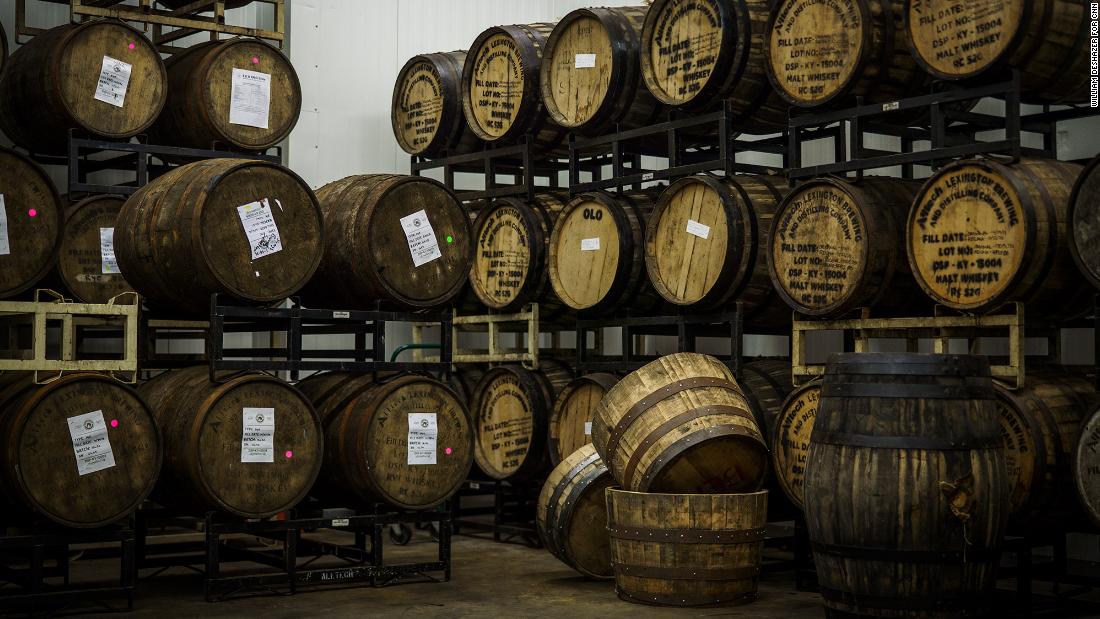Owner Amir Peay had big dreams selling James E. Pepper in Europe when he started producing these bottles four years ago. He rented space in a warehouse in Europe, setting up a whole new distribution system. But then Trump launched a series of trade fights with the European Union, which retaliated by imposing a 25% tariff on American whiskey, making bottles of Peay much more expensive for European drinkers.
“We’re still on death row,” Peay said.
To be considered a pure bourbon, whiskey must be aged for at least two years. James E. Pepper spirits generally take longer.
It is one of the oldest whiskey brands in the United States, production of which began during the War of Independence and is closely linked to American history. The Old Fashioned cocktail was created in honor of Colonel James E. Pepper and the distiller was instrumental in passing the Bottled in Bond Act, one of the first federal consumer protection laws.
The brand and the distillery were abandoned for decades before Peay resumed distilling under the name in 2008. He rebuilt the operation on the land of origin, reopened in 2017, and named the flagship label “1776”.
“When we fill barrels with whiskey today, we are planning what we will do with it in four years. And we have made plans and projections based on the stocks put in reserve for Europe that will not materialize,” added Peay, an entrepreneur and history buff who resurrected the James E. Pepper brand after discovering its rich past.
Distillation is a long term process. It starts with grinding the grain, which is then fermented at the top level of the distillery, Peay explained, dipping his finger into the vat for a taste one day this week.
“This one has been cooking for about 42 hours and will be shut down tomorrow,” he said.
It will then be stored in an offsite building, known as the rickhouse, to age, meaning that today’s barrels will likely land on shelves in 2025. But Peay has no idea if there is. will have a demand for James E. Pepper Whiskey in European Bars and Restaurants at the time it does.
“There is no guarantee that we will ever regain that momentum. Once you lose that place on a shelf, the consumer has tried something else,” he said.
Collateral damage in Trump’s trade war
Targeting whiskey had another political advantage – it caused problems for industries in Kentucky, the home state of Republican Senate leader Mitch McConnell. And Harley Davidson is based in Wisconsin, which in 2018 was represented by former Rep. Paul Ryan, then Speaker of the House.
Biden leaves Trump’s tariffs in place
“We are optimistic that the Biden administration is doing all it can to resolve these complex business issues,” said Chris Swonger, president and CEO of the Distilled Spirits Council.
A whiskey “bargain”
Brown-Forman, which makes Jack Daniel’s and is America’s largest exporter of whiskey, has been hit extremely hard, bearing around 15% of the country’s total tariff bill from Europe and the UK, said the CEO Lawson Whiting on an earnings call in March.
Still, the industry is doing very well overall.
“Prices were hit hard, but national growth and interest in bourbon peaked and held steady,” said Fred Minnick, author of “Bourbon: The Rise, Fall and Rebirth of an American Whiskey” .
While distillers face higher taxes abroad, those at home have been reduced. At the end of last year, Congress made permanent a tax cut temporarily put in place by the 2017 Tax Reform Act. It cuts the federal excise tax to $ 2.70 per gallon from $ 13. $ 50 for the first 100,000 gallons produced, which makes a big difference, especially for small craft stills.
“Last year has been a good year,” said Conor Lennon, an economist at the University of Louisville – but, he added, “This is not an argument for tariffs. They would like to sell here and there.”
A lost opportunity
The Town Branch Distillery, named after the hard water cove that runs through Lexington and is a key ingredient in Kentucky whiskey, could easily increase its exports overseas if it weren’t for the tariffs.
Its parent company, Alltech, has a distillery in Dublin and the Lexington site could take advantage of its distribution network to develop its international activities.
But the tariffs were put in place before export growth was an important part of Town Branch’s plan.
“It hurt us because we couldn’t grow with our sister operation,” said Alan Kennedy, the distiller and blender.
For now, Town Branch is also seeing growth at home and as the only Lexington stop in Kentucky. Bourbon Trail – and the only one with a brewery also on-site – spirits director Rob Krass is optimistic that next year will be just as strong as the country opens up.
“We didn’t lose to Europe. We lost the opportunity in Europe,” Krass said. “But we are ready to go when the time is right.”
CNN’s Brett Roegiers contributed to this report.

